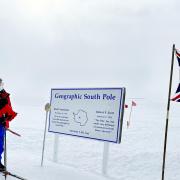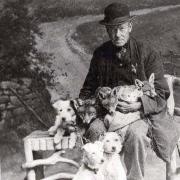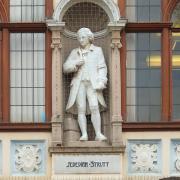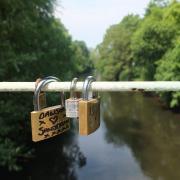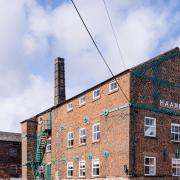Derbyshire Life spends a day training with Derbyshire Police Dog Unit under the watchful eye of operational dog handler PC Dan Houareau

When I learned that I was going out on a training day with Derbyshire Police’s Dog Unit, I wasn’t sure what to expect. Never one to stint on my research, I googled ‘German Shepherd’ which took me to the Kennel Club website, and informed me that the breed were in the ‘pastoral group’ of dogs. That didn’t sound too bad, I thought. Pastoral conjures up images of rolling hillsides, lush green fields and long summer days. How bad could it be?
So imagine my surprise when the next day found me crouched in a squalid little hotel room in Buxton listening to the panting breath of a dog as it rattled up a staircase, getting closer to my hiding place by the second.
Then the good news: the claw rattling stopped. The not so good news was that the panting had got a whole lot louder. In fact it was right outside the door and that door was about to be pushed open by a big, blunt, police dog snout. I looked out of the pokey hotel window, through the cobwebs and grime, and over the slate rooftops of Buxton. Was it worth making a run for it?
But any thoughts of escape were interrupted by the dog rushing in and PC Dan Houareau of Derbyshire’s Police Dog Unit, who had been waiting patiently with me, edging closer.

‘Just keep perfectly still and you’ll be fine,’ he said quietly. Guess what? I did exactly as Dan suggested. The dog – Renko, I later found out once we had been formally introduced – rushed up and barked in my face for a few moments, before his handler came in and broke the spell.
‘Good dog!’ he said, the pleasure evident in his voice. Then this six foot tall burly policeman produced a well-chewed ball on a piece of coloured rope and tossed it to Renko. Renko took hold of it and this highly trained hound was suddenly three months old again. Then he dropped the toy and his tongue lolled like the big daft pup he had suddenly become. He looked up, delighted to have pleased his handler.
As for me, had I really been up to no good, I couldn’t help but think of the sense of rueful irony I would feel at this moment, if this slavering beast that had tracked me down and terrified me into submission had so reverted to puppyhood on my capture.
Dan Houareau has been with the Police for 16 years. He emigrated to Australia in his 20s and had a spell with the Australian police before returning and following in the footsteps of his father who had been a bobby on the beat in Glossop and New Mills.

Dan joined the dog unit at the first opportunity. Such openings are rare and highly sought after, so when a position arose he gave it his best shot. ‘When it was advertised I thought, “Right, I am going to put everything into it,”’ says Dan, ‘and I was lucky to get it as in the last ten years we’ve only brought on about five or six handlers.’
Training is a continuous business for both dog and handler, and I had joined Dan and two other Operational Dog Handlers, PC Max Boyce and PC Chris Stanyard, on one of their training days with dog trainer Ian Head. We were in the Grove Hotel in Buxton, which has been empty for a few years now but is still at least partly furnished and offers a realistic environment where they can work with the dogs.
Today they are practising search skills. They will take it in turns for a handler to be given a few minutes start to hide in the hotel, then another will go in with their dog and try to find them. I was, they told me, a welcome distraction, something different to test out the dogs, because they weren’t used to me and it was a good opportunity to see how they would react.
‘The dog is trained to search,’ Max explained while Dan guided his dog Coba as she began to search the building floor by floor. ‘What we do is harness the dog’s prey drive, which is its natural drive to go out and find something.’
The trick, Max explained, is to associate the ‘prey’ in the dog’s mind with locating their target – in this case a person who is hiding out. They do this with careful training and by rewarding successful outcomes. The reward they use is always play – the toy – rather than food treats, in part so that the dogs don’t become distracted by food when they are working. (Hence the well chewed ball and rope given to Renko, when he found me earlier.)
Dan – or rather his dog Coba – finally found her man, hiding down in the cellar. By the time we got there she had him pinned in a corner and was giving him a good barking to.
This is all good fun of course, but creeping round the narrow corridors of this deserted hotel did feel spooky, and you can’t help but think how nerve-wracking it must be if you really didn’t know what – or who – was lurking around the next corner.
Dan has actually attended a live job at the Grove Hotel. The dog unit is called in by police officers on the ground if they think they would be helpful. On this occasion, the police had a report that someone had been seen entering the building, but not leaving again. It was night, it was dark, and there are no lights in this hotel. I ask Dan to explain how he feels on jobs like that, searching these deserted corridors.
‘I felt quite calm actually, because I have every faith in the dog,’ Dan tells me. ‘I have trained with them so much, to the highest standard possible, that I know with the bond that I have built up with the dog, I know that they would die for you. They would do anything for you. I am biased I know, but I find the German Shepherd the most loyal dog that I have ever had.’
Max though is keen to stress that they never knowingly put their dogs at risk. ‘We would never put a dog into a dangerous situation,’ he says. ‘The handler has to justify the use of the dog. If something happens, if I don’t think it is safe to search that building because there are glass or chemicals in it, then I won’t do it. The welfare of the dog is my paramount responsibility.’
This is fine as long as there is intelligence on the building, or the situation, but this isn’t always the case. Sometimes situations are unpredictable, and those caught up in events just have to react. Dan tells me of one case where he was called to a remote farm in Derbyshire. ‘We knew that the farmer had tried to kill his wife earlier that day, and he was going to be arrested for that attempted murder,’ Dan recalls. Firearm support was called, then a shot rang out from inside. As it turned out, the man had unfortunately shot himself, but in the moment, Dan didn’t know that for certain.
‘There was a time there when I went in with the firearms unit and with my dog, with a view to perhaps searching for that person who may have had a weapon on them potentially aimed at me, and potentially I may have been sending my dog to his death. But that is what he is trained to do.’ However, these sort of cases fortunately do not form the majority of their work. In terms of effectiveness, deterrent ranks highly as a dog unit tactic, particularly in crowd control, or when things get a little bit rowdy late at night. ‘You will turn up in a town centre, they can hear the dog barking in the van and they decide “Right, I’ve had a good night, I’m going to go home in my taxi now,”’ says Dan with a smile.
A significant part of their work is searching for ‘vulnerable people’, which can include older people with dementia, who have gone missing from their homes.
Police dog handlers are assigned their own dogs which live with them, but not in the house – they are kennelled in the garden. All kennels and equipment are supplied by the police. Despite this, Dan says that his dogs are very much a part of his family – he is married with teenage children. He now has Coba, the German Shepherd bitch, Kane, who is a retired German Shepherd dog, and Jack, a labrador, who is a sniffer dog. It was Jack’s turn to be put through his paces next.
Sniffer dogs are trained to find drugs, firearms and money. Which, if you think about it (and I admit that I previously hadn’t), are three things often likely to be found together. A few doors down from the Grove Hotel in Buxton is a branch of Bridgfords Estate Agency, which helps out the dog unit by allowing them to use their office to help train the dogs – again, giving them that ‘live’ experience that is so important for their development.
I went in with Max and watched him plant a few spent bullets in a drawer before we left and Dan went in with Jack the Sniffer a few minutes later. The best way to describe Jack is as a big daft lad, in the nicest possible sense of course. He thundered around the shop for a few moments, much to the surprise of a couple who were discussing a property with Bridgfords’ sales negotiator Katie Gooding, before heading straight to the drawer where Max had stashed the ammo and giving it a jolly hard stare. It was all very impressive.
‘We’ve met four of the dogs now,’ Katie told me later, ‘One was called Big Mick, he was lovely, and one was called Little Tilly, a cross breed that had been rescued at 14 months old and then trained to be a police dog. It was really good to learn about the dogs, and anything we can do to help to crack down on crime, then great!’
Back in the hotel we make a makeshift camp and pull out our flasks and sandwiches. Then Dan produces a big Victoria sponge cake and puts it on a dusty bar table. It is the most surreal case of afternoon tea I have ever had to investigate in Buxton.
Talking to the handlers and having spent the morning with them, I was struck by how close they clearly were to their dogs. I’d expected the dogs to be viewed more as working tools, when it seemed they thought of them more as colleagues.
‘They are part of the dog section and part of the dog unit. They are part of what we do,’ says Max. ‘We love working with them and you do find that you bond with your dog. They trust you and you trust them. It is a relationship that works two ways. It’s all I’ve ever wanted to do. I’ve never wanted to be a traffic bobby, I wanted to be a dog handler.’
Police Dog Units nationally have found themselves at the sharp end of cuts to the police budget in recent years. The trend has been towards merging dog units between police forces – South Yorkshire has merged with Humberside, for instance, and the East Midlands forces have merged their dog units, except for Derbyshire which still retains its own. The reason Derbyshire is fighting to retain its dedicated unit is that in a rural constabulary, response times can be long due to the sheer number of miles a dog unit may have to cover to reach an incident. If forces merge their dog units, response times could be longer. In April 2016 it was announced that Derbyshire’s dog unit has been retained at 15 handlers.
If you have premises you would be willing to allow the Derbyshire Police Dog Unit to use for their training sessions, as Bridgfords Estate Agency did in this article, please contact the Derbyshire Dog Unit directly on 101 and ask for the dog unit, or follow them on Twitter @DerbysDogPolice – it is vitally important that the dogs are trained in realistic and varied environments, and it is fascinating to watch them work!








